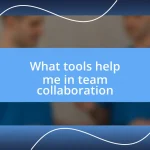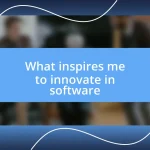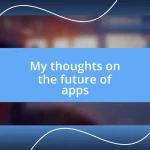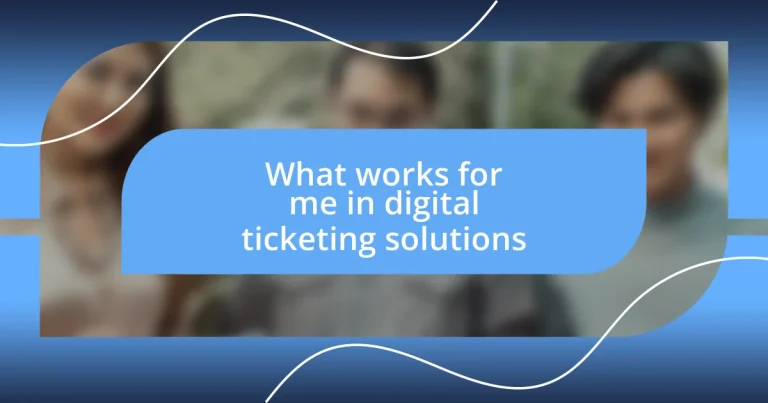Key takeaways:
- Digital ticketing solutions enhance user experience through convenience, sustainability, and real-time engagement, transforming event access.
- Choosing the right platform involves considering feature sets, customer reviews, and security measures to meet specific needs effectively.
- Future trends indicate a shift towards personalization, AI-driven recommendations, and blockchain technology to improve security and user engagement.
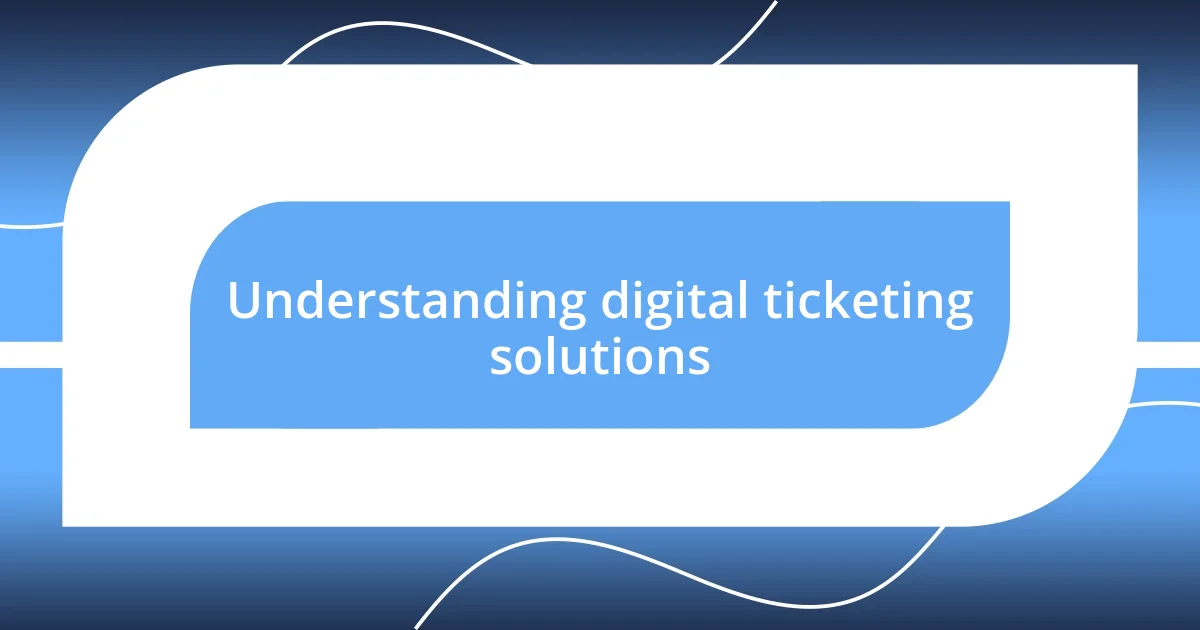
Understanding digital ticketing solutions
Digital ticketing solutions have transformed how we access events, streamlining the entire process from purchase to entry. I remember my excitement the first time I skipped the long queues at a concert because I had my e-ticket on my phone. It felt like an effortless experience, highlighting just how convenient technology can be in enhancing our enjoyment of live events.
At their core, digital ticketing solutions integrate technology to improve user experience. Do you ever wonder how many fewer trees are saved with electronic tickets compared to traditional paper ones? Each time we opt for a digital format, it’s not just a matter of convenience; it also contributes to sustainability—a cause I’m quite passionate about.
Moreover, these solutions often come with features that provide additional value. For example, I once received real-time updates about my seat location and event changes through an app. It made me feel connected and informed, rather than anxious about missing out. This kind of engagement is what truly elevates digital ticketing beyond mere entry passes; it creates a whole ecosystem of interaction and support.
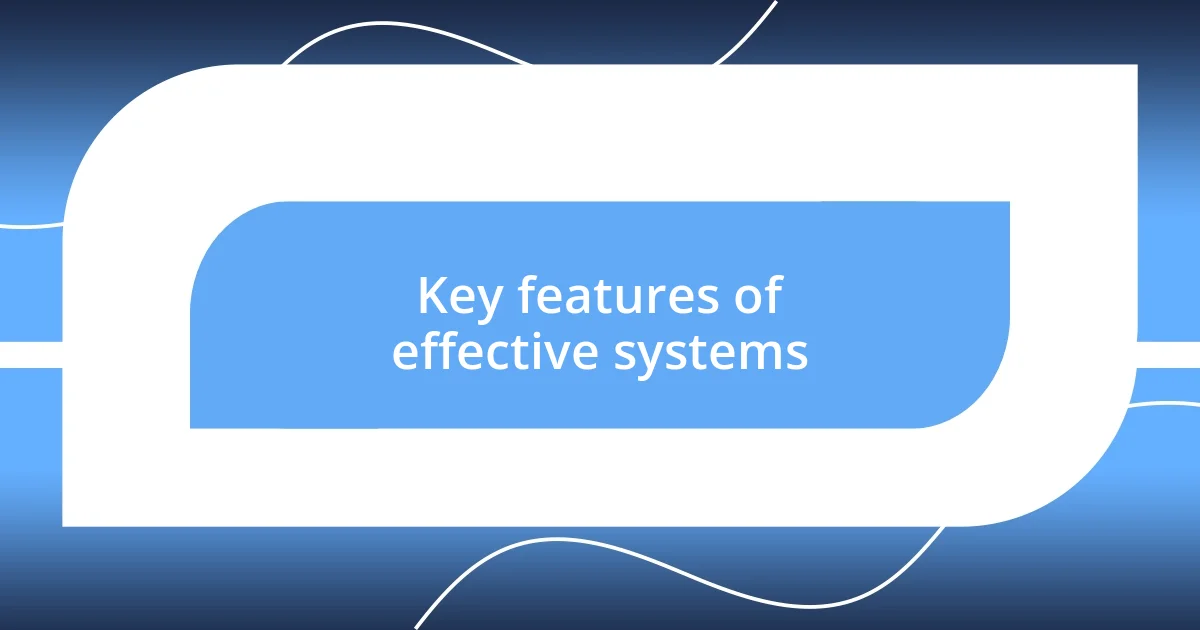
Key features of effective systems
One of the key features of effective digital ticketing systems is user-friendly interfaces. I still recall the frustration I felt while using a convoluted ticketing site that took ages to navigate. A streamlined experience, where I can easily browse, select, and purchase tickets in just a few clicks, dramatically enhances my satisfaction. The moment I can buy a ticket without a headache, I know I’ve found a platform that truly understands its users.
Another critical aspect is mobile accessibility. I can’t emphasize enough how much I appreciate being able to manage my tickets directly from my phone. There have been several occasions where I’ve been running late for an event, and activating my ticket right from my smartphone has saved the day. It’s that kind of flexibility that not only eases my mind but also reinforces my choice of using a digital solution.
In addition, it’s essential to have reliable customer support integrated into these systems. Picture this: I once encountered an issue with my e-ticket while traveling. I was in a different city, feeling the stress of potentially missing my event. Thankfully, the ticketing app had a chat feature that connected me to a real person in seconds! That level of support made all the difference, turning a stressful situation into a seamless resolution.
| Feature | Description |
|---|---|
| User-Friendly Interface | Easy navigation for ticket selection and purchase. |
| Mobile Accessibility | Management of tickets directly through smartphone applications. |
| Reliable Customer Support | Instant assistance through chat or help sections in case of issues. |
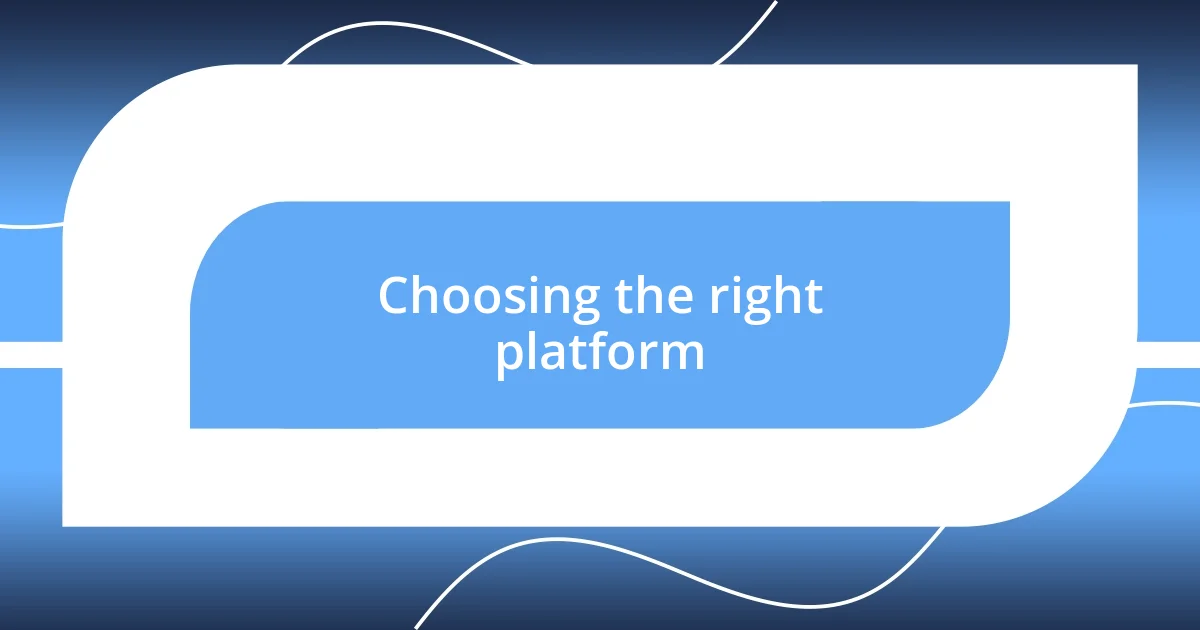
Choosing the right platform
Choosing the right platform for digital ticketing can feel overwhelming, but I’ve learned that focus on specific needs simplifies the decision. Once, I struggled with a platform that offered countless features, yet lacked the one I needed most: easy ticket transfers for friends. As I delved deeper into options, I realized that identifying a few key priorities, like ease of use and support for group purchases, made the selection process so much smoother.
Here are some essential factors to consider when choosing your digital ticketing platform:
- Feature Set: Ensure the platform has the specific tools you need, such as ticket sharing or refunds.
- Customer Reviews: Look for user testimonials to gauge real-life experiences and satisfaction levels.
- Pricing Structure: Evaluate the cost to ensure it aligns with your budget and offers value for the features provided.
- Integration Capabilities: Check if it can easily integrate with other systems you use, like CRM or marketing tools.
- Security Measures: Prioritize platforms that protect your personal data and offer secure transaction processes.
In my journey to find the right platform, focusing on these factors elevated my ticketing experience significantly, allowing me to attend events with peace of mind.
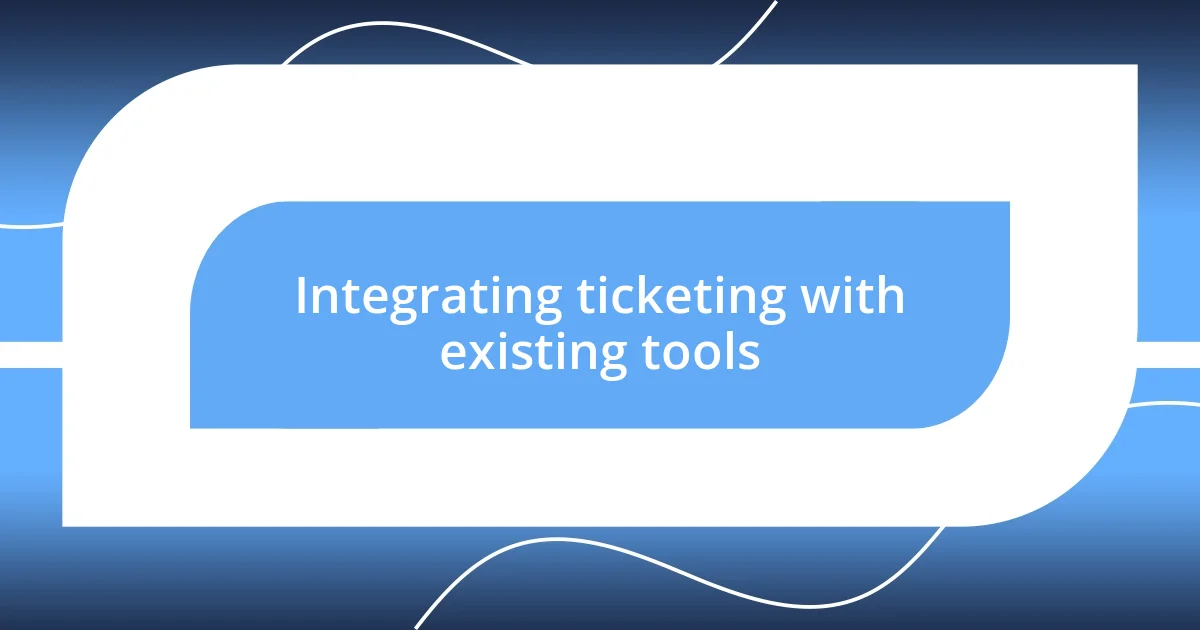
Integrating ticketing with existing tools
Integrating ticketing with existing tools is vital for streamlining the entire event experience. I remember when I first implemented a ticketing system that synced with our customer relationship management (CRM) software. The ease with which our team could access customer data and manage ticket sales transformed our workflow; no more jumping between platforms, just seamless information flow. Have you ever experienced the frustration of duplicated efforts? By merging ticketing with our CRM, we eliminated that completely.
When looking at integration options, I discovered how essential it was for the ticketing software to connect with our marketing tools as well. Imagine being able to send targeted promotions to attendees right after they purchase tickets! That’s exactly what happened when we integrated our email marketing platform, and the result was a noticeable boost in our engagement rates. It felt rewarding to leverage existing resources efficiently, and I can’t stress enough how much that personalization improved our attendee satisfaction.
Moreover, setting up reminders and notifications through tools like workflow automation made a world of difference. There were times I’d forget important updates about the event until it was too late. With an integrated solution, key reminders popped up on my dashboard, ensuring I stayed on top of everything—no more last-minute scrambles! This not only saved me time but also gave me peace of mind knowing everything was interconnected and under control. How could you benefit from such an organized approach in your own processes?
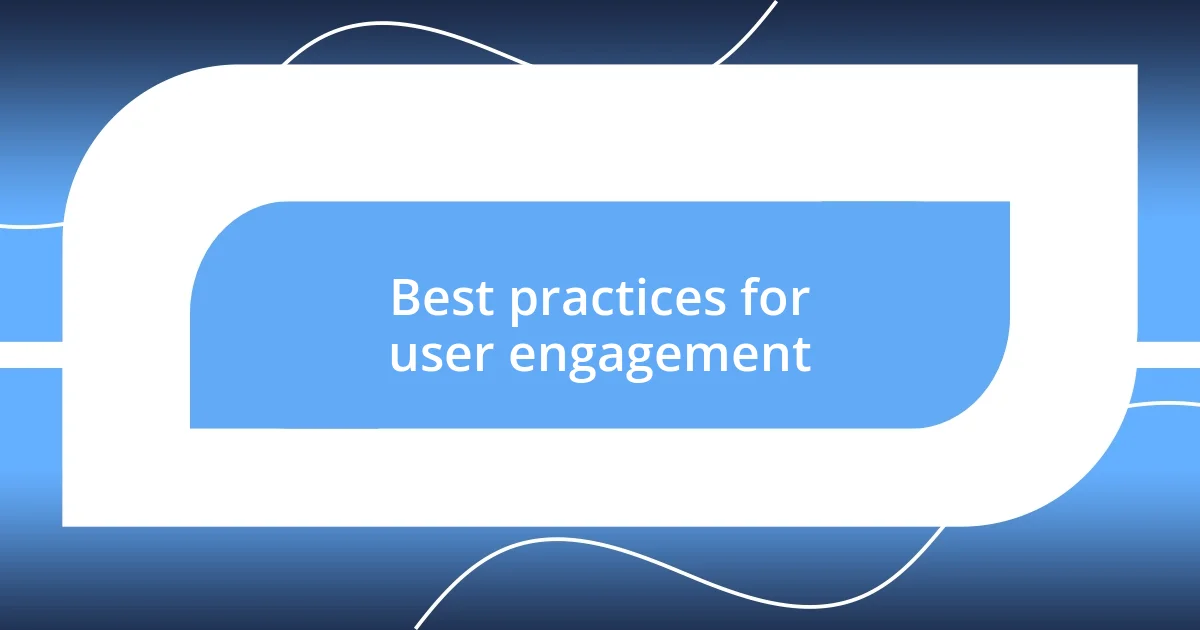
Best practices for user engagement
Engaging users effectively in digital ticketing isn’t just about having a platform; it’s about creating memorable interactions. I once attended an event where the organizer personalized the ticket confirmation emails with not just event details, but also fun facts about the performers. It felt as if they were speaking directly to me, and that immediate connection instilled excitement for the show. Don’t you think personal touches like this can make a huge difference in user experience?
Another practice I found invaluable was leveraging social media channels for engagement. I recall a festival I attended that encouraged attendees to share their favorite moments in real-time, using a specific hashtag. This not only amplified the excitement but also fostered a sense of community among strangers. Imagine how powerful it is when attendees become part of the narrative; they feel invested and eager to return for future events!
Lastly, a straightforward feedback loop can’t be overlooked. After one event, I received a simple survey asking about my experience, and I felt truly valued as my opinions seemed to matter. I realized how crucial it is for ticketing solutions to incorporate a user-feedback mechanism. How often do we miss opportunities for improvement just because we don’t ask? Engaging users in this manner fuels a cycle of improvement and loyalty.
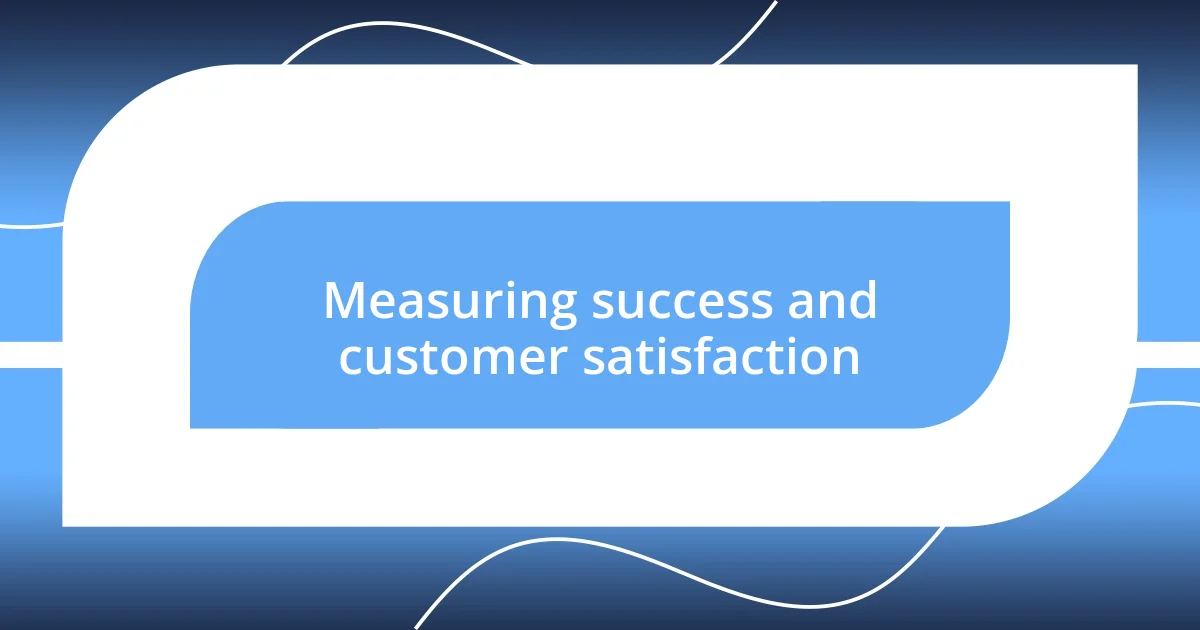
Measuring success and customer satisfaction
Measuring success in digital ticketing isn’t just about numbers; it’s about understanding the heartbeat of your audience. I remember when I first started tracking the metrics after implementing a new ticketing system. The initial excitement of sales numbers was undeniable, but as I delved deeper into customer feedback, I realized that success was also about their overall experience. Did they feel valued? Did they engage with our post-event communications? These insights helped me tweak our approach to better meet their needs.
Customer satisfaction can be quantified through various methods, but I found that direct engagement often yielded the richest feedback. At one event, I organized a quick, informal chat session post-show where attendees could share their thoughts. The genuine enthusiasm and constructive criticism I received were enlightening. How often do we overlook the simple act of conversation? By fostering an open dialogue, I not only gained immediate insights for future events, but I also made attendees feel heard and appreciated.
One of the most impactful ways I’ve measured success was through repeat attendance rates. After implementing a survey asking what attendees loved and what could improve, I noticed a significant uptick in returning customers. It struck me how valuable it was to create an environment where attendees felt their input shaped future experiences. Have you ever realized that a simple survey can foster loyalty and transform your community? When customers feel invested in your events, their loyalty naturally follows, shining a light on your path to success.
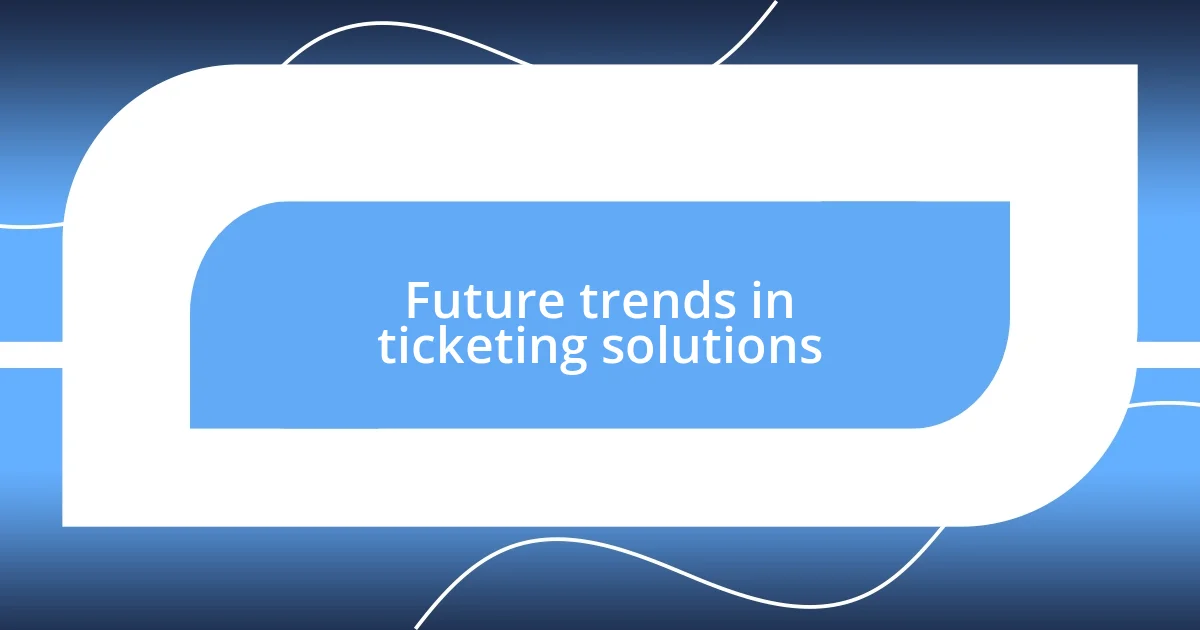
Future trends in ticketing solutions
The future of ticketing solutions is leaning heavily towards personalization and AI-driven experiences. Recently, I attended a concert where the ticketing platform utilized machine learning to recommend shows based on past attendance and preferences. This tailored approach not only made choosing events seamless but also ignited a thrill of discovery that I hadn’t felt in a while. Isn’t it refreshing when technology works in our favor to enhance our experience?
Moreover, the integration of blockchain technology is poised to revolutionize ticket authenticity. I once faced the frustration of buying a ticket, only to discover it was fraudulent. Imagine a world where blockchain ensures that every ticket can be verified as genuine from the moment of purchase to entry. This kind of security would not only ease consumer anxiety but also help event organizers maintain their reputations. Don’t you think it’s time we moved toward a more secure ticketing environment?
Lastly, the rise of immersive and augmented reality experiences is reshaping the way we think about events before, during, and after they occur. I remember trying an AR preview of an art exhibition from my living room—it was captivating to walk through the virtual space before the actual event. With these technologies becoming more accessible, future ticketing solutions will likely incorporate virtual experiences that bridge the gap between online engagement and physical presence. It begs the question: are you ready to explore events through a whole new lens?
